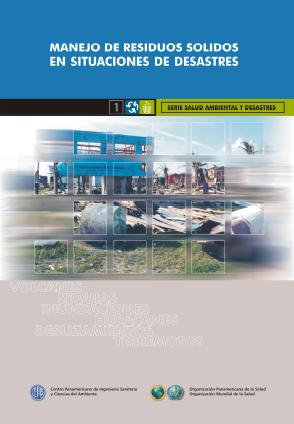

|
Solid
waste management in disaster situations (PAHO, 2003)

How
does a natural disaster affect the solid waste management system
of a city? What actions should be taken to manage wastes, such as
rubble, debris, trees and weeds and-at worst- human and animal bodies?
How should the needs of provisional shelters and camps of victims
be met? How should hazardous wastes, as those generated in health
facilities, be managed? In what aspects and how the community involvement
should be encouraged?
Solid
waste management in disaster situations is a guideline that answers
the above and other concerns based on the experience of Latin America
and the Caribbean. It was prepared by several professionals from
different countries of the Region who have specialized both in the
management of disasters and solid waste. The volume is addressed
to the technical personnel of the sanitation sector, health professionals,
and all those specialists who collaborate in the recovery of basic
services damaged by disasters to safeguard the population's health.
Besides
the guidelines and basic actions, the book offers case studies on
solid waste management after different types of disasters occurred
in the Region: the earthquake that affected the Eje Cafetero in
Colombia (1999), the eruption of El Reventador volcano in Ecuador
(2002), and the avalanches along the central Coast of Venezuela
(1999). Furthermore, it includes texts on the Oakland forest fires
(1991) and the floods in the Midwest of the United States (1993).
|